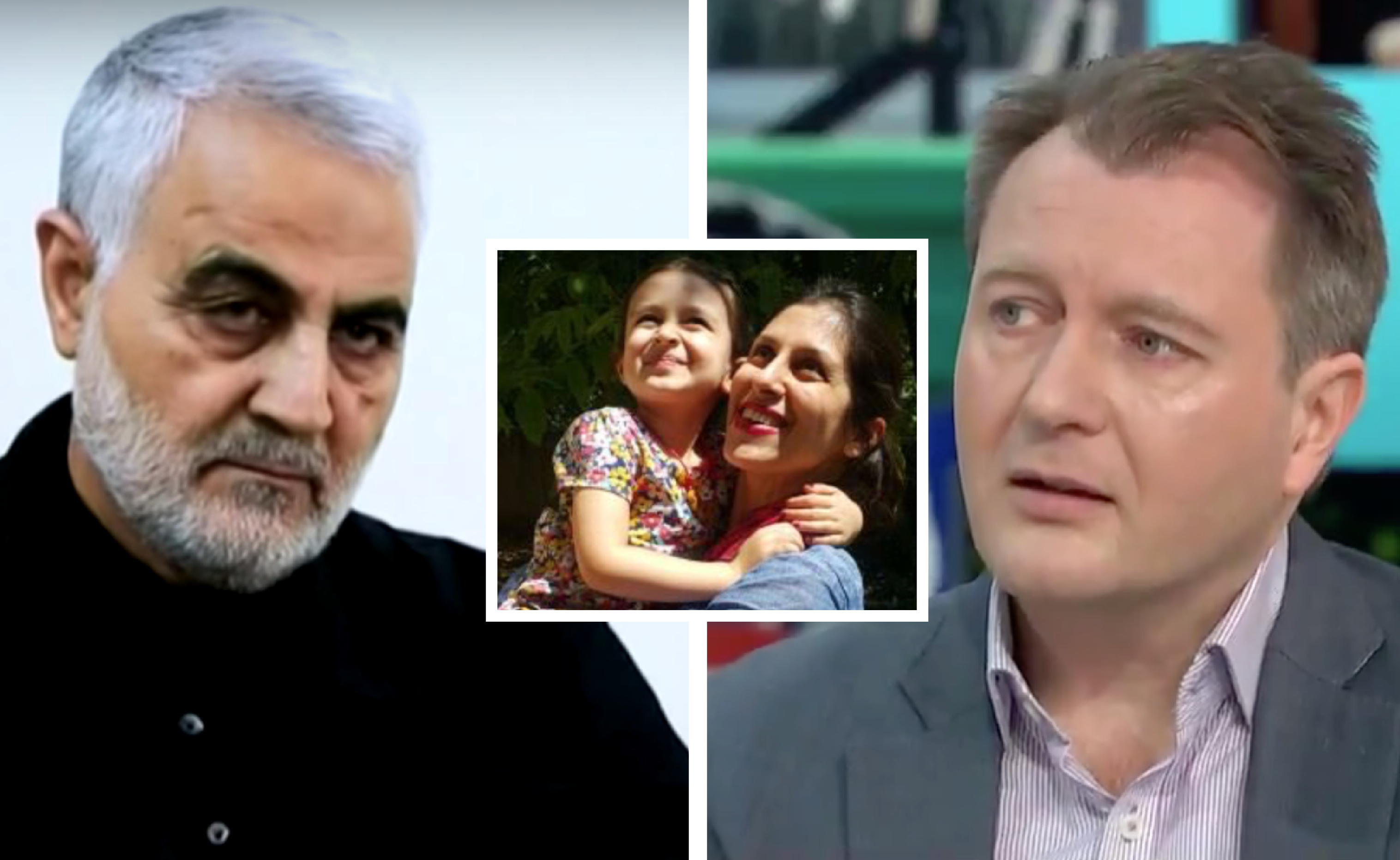The husband of a British mum arbitrarily detained in Iran fears the killing of a top Iranian military general by US drone strike could make his campaign to free her “more difficult”.
Richard Ratcliffe said on Friday (3 January) that the killing of Qasem Soleimani in the early hours of today could complicate the release of his wife, Nazanin Zaghari-Ratcliffe.
Soleimani was the leader of the Quds force – the elite, external wing of the Iranian Revolutionary Guard, a body which has held Nazanin in prison for around four years.
Ratcliffe warned that UK and US relations with Iran are “getting much worse again” on ITV’s Good Morning Britain (GMB).
“I sit here partly worried for what that means for Nazanin, partly worried what that means for my in-laws, sat in their ordinary living room in Tehran where they’re all really worried,” he said.
Nazanin, who is an Iranian-British dual national, announced last month that she would be going on hunger strike in solidarity with Kylie Moore-Gilbert, a British-Australian academic, who is also being held in Iran.
Moore-Gilbert started an open-ended hunger strike six days ago in protest at being sentenced to 10 years on espionage charges.
‘He owes us, and should sit with us and explain.’
Nazanin Zaghari-Ratcliffe’s husband is still hopeful for talks with Boris Johnson in the fight to release his wife from an Iranian jail.
The mum-of-one was jailed in 2016 after being accused of spying while visiting family. pic.twitter.com/RpuQc6jcgp
— Good Morning Britain (@GMB) January 3, 2020
Richard Ratcliffe added: “For those of us who are caught in the middle between Iran and the West … it will be more difficult. Quite what that means, I think it it really hard to tell. And probably a bit premature for me to be pushing it.
“How do we get out of this situation? I mean, goodness knows at this point. In general, my job is to keep knocking on the door of the prime minister. and say: “listen, you’re responsible for protecting all of us in all the different ways you can.”
Nazanin, who works for news organisation the Thomson Reuters Foundation, was arrested at Tehran Airport in 2016 by the Revolutionary Guard on her return visit from seeing her parents and family with her 22-month-old daughter, Gabriella.
She was sentenced to five years in jail after being accused of spying. She denies the charge, maintaining that she was simply visting family.
Richard has been pushing to have a meeting with prime minister Boris Johnson, a call which he renewed in the wake of today’s attack.
He said that Johnson complicated his wife’s case by mistakenly referring to her as a journalist in parliament while he was foreign secretary. This information was later used as evidence against her during her trial.
The Office of the United Nations High Commissioner of the for Human Rights has stated that Nazanin has been arbitrarily deprived of her liberty and her right to a fair trial.
What Happened?
Soleimani, 62, was Iran’s most powerful military commander and his killing marks and major escalation in tension between Washington and Tehran.
He and officials from Iranian-backed militias – including Abu Mahdi al-Muhandis – were leaving Baghdad airport in two cars when they were hit with several missiles.
The Pentagon has said in a statement that the strike was a “defensive action to protect US personnel abroad” and accused Soleimani of “actively developing” plans to attack American diplomats and service members in Iraq and the wider region.
It added: “The United States will continue to take all necessary action to protect our people and our interests wherever they are around the world.”
Days earlier, protesters attacked the US embassy in Baghdad – clashing with US forces – in an attack the Pentagon said was approved by Soleimani.
Iran’s Supreme leader Ayatollah Ali Khamenei responded by saying that “severe revenge awaits the criminals” behind the attack.
Foreign secretary Dominic Raab has called for de-escalation on all sides.
He said: “We have always recognised the aggressive threat posed by the Iranian Quds force led by Qasem Soleimani. Following his death, we urge all parties to de-escalate. Further conflict is in none of our interests.”
Labour leader Jeremy Corbyn has described the “US assassination” of Soleimani as “an extremely serious and dangerous escalation of conflict with global significance”.
He added: “The UK government should urge restraint on the part of both Iran and the US, and stand up to the belligerent actions and rhetoric coming from the US.”
‘Most Likely Unlawful’
Agnes Callamard, the UN special rapporteur on extra-judicial killings, has said that the US’ targeted killing of Soleimani and other figures most likely violates international human rights laws.
In a Twitter thread, she said: “To be justified under international human rights law, intentionally lethal or potentially lethal force can only be used where strictly necessary to protect against an imminent threat to life.
“In other words, whoever targeted these two men would need to demonstrate that the persons targeted constitute(d) an imminent threat to others. An individual’s past involvement in “terrorist” attacks is not sufficient to make his targeting for killing lawful.”
She added that the legal test for “anticipatory self-defence” is very narrow, and it is “unlikely” to be met in this instance.







